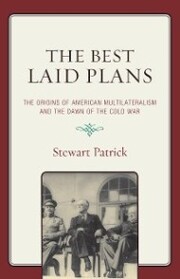- Zusatztext
The long-standing, but unresolved debate of the virtues and values of multilateralism vs. unilateralism in American foreign policy is critically important in today's complicated world. To understand the history of each approach is to understand their opportunities and challenges for the future. The Best Laid Plans answers two central questions. First, why did the United States embrace the principles and practices of liberal multilateralism during World War II? Second, why did it cling to this vision of world order despite the outbreak of the Cold War in the late 1940s, as the 'One World' that had been anticipated by U.S. postwar planners split into two rival global camps? The book contends that neither the U.S. turn to liberal multilateralism nor the persistence of this orientation during the Cold War can be attributed solely or even primarily to the global power structure or crude considerations of material self interest. Rather, Stewart Patrick argues that a combination of enduring identity commitments and new ideas, based on the lessons of recent, cataclysmic events, shaped the policy preferences of American central decision-makers in the Roosevelt and Truman administrations. Although the book is steeped in history, its conclusions have tremendous relevance for the contemporary era, when the United States once again finds itself at the apex of world power, and debates are rife about the role of multilateral cooperation in the realization of U.S. foreign policy objectives.
- Kurztext
Best Laid Plans looks at the long-standing but unresolved debate of the virtues and values of multilateralism vs. unilateralism in American foreign policy. Stewart Patrick argues that a combination of enduring identity commitments and new ideas, based on the lessons of recent, cataclysmic events, shaped the policy preferences of American central decision-makers in the Roosevelt and Truman administrations. Although steeped in history, the book's conclusions have tremendous relevance for the contemporary era, as debates are rife about the role of multilateral cooperation in the realization of U.S. foreign policy objectives.
- Autorenportrait
Stewart Patrick is senior fellow and director of the Program on International Institutions and Global Governance at the Council on Foreign Relations. He is the coeditor of Multilateralism an U.S. Foreign Policy: Ambivalent Engagement (2002) and Good Intentions: Pledges of Aid for Post-Conflict Recovery (2000).
The long-standing, but unresolved debate of the virtues and values of multilateralism vs. unilateralism in American foreign policy is critically important in today's complicated world. To understand the history of each approach is to understand their opportunities and challenges for the future. The Best Laid Plans answers two central questions. First, why did the United States embrace the principles and practices of liberal multilateralism during World War II? Second, why did it cling to this vision of world order despite the outbreak of the Cold War in the late 1940s, as the 'One World' that had been anticipated by U.S. postwar planners split into two rival global camps? The book contends that neither the U.S. turn to liberal multilateralism nor the persistence of this orientation during the Cold War can be attributed solely or even primarily to the global power structure or crude considerations of material self interest. Rather, Stewart Patrick argues that a combination of enduring identity commitments and new ideas, based on the lessons of recent, cataclysmic events, shaped the policy preferences of American central decision-makers in the Roosevelt and Truman administrations. Although the book is steeped in history, its conclusions have tremendous relevance for the contemporary era, when the United States once again finds itself at the apex of world power, and debates are rife about the role of multilateral cooperation in the realization of U.S. foreign policy objectives.


 Kundenlogin
Kundenlogin


